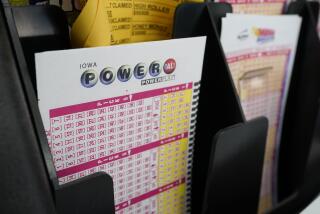Looking at the Lottery
- Share via
The Los Angeles Times Poll has revealed some fascinating information about the California Lottery and who plays it. More men than women play; the lottery is particularly attractive to Latinos; most lottery players don’t engage in other forms of gambling, and the lottery is more popular with crafts people than with professionals.
Most players play to win, of course. But they have fun at it, even though they know that their chances of winning a bonanza are slight. And a large number of lottery players are conscious that some of the proceeds go to promote California education.
The results are somewhat encouraging in that they indicate that, on the whole, poor people do not throw away an inordinate amount of their scarce dollars on lottery tickets. Persons with incomes of $10,000 a year or less account for about 10% of the population but only about 9% of the lottery players. The big action comes in the $20,000-$30,000-a-year bracket. The poll did indicate, however, that poorly educated Californians are heavy players. Also, polls tend to show averages that gloss over the tragic individual stories of compulsive gamblers who cannot afford this sort of fun.
The poll tables also demonstrate that the odds show no respect for age, income, ethnic background, religion or any other demographic fact. All across the line, those who won spent an average of $2 to get $1. The lottery is a sure thing: On the average, the average person will lose.
In all, however, state lottery officials have to be pleased with the poll results. The poll confirms, for one thing, their strategy of promoting the lottery as something that is fun, that makes you feel good and that benefits society through the 34% of lottery proceeds that go to California education. All lottery commercials end with the tag line, “Our schools win, too.”
The aid to schools, of course, has been the justification all along for the state to engage in gambling at virtually every corner market and gas station. The state’s success in promoting this message may be a little too successful, particularly in view of the widespread knowledge that ticket sales in the first year have vastly exceeded expectations. There is the danger that Californians will come to believe that the lottery is the solution to the state’s school financing problems.
This is far from the case. Even with the unexpected windfall of the big ticket sales, the lottery income accounts for only 3% or 4% of the education budget, says Bill Honig, state superintendent of public instruction. “This is supposed to be icing on the cake. It’s not going to substitute for the normal increases we get in each budget year,” he said. But there will be the constant temptation in the Legislature to factor lottery income into the education pie, in spite of the Deukmejian Administration’s commendable tactic of listing lottery income as a separate and distinct budget item.
All of this puts lottery officials in a strange fix: The more they promote gambling as an enterprise that makes people feel good and that benefits society, the more they are open to criticism on a moral basis. But if they promote it less, and ticket sales fall, they will be criticized for not doing their job and making the best of an opportunity for generating new funds for the schools. Of course, that was the problem with the state getting into gambling in the first place.
More to Read
Sign up for Essential California
The most important California stories and recommendations in your inbox every morning.
You may occasionally receive promotional content from the Los Angeles Times.










